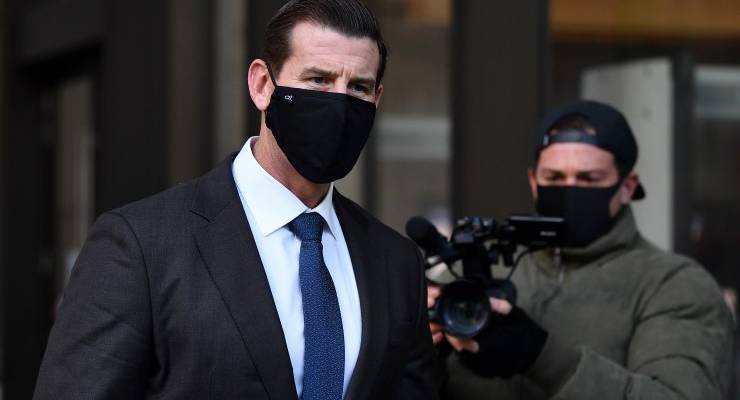
The general public revered Ben Roberts-Smith to such an extent that some people would “fall into his arms” on meeting him, and share their own experiences, former defence minister Brendan Nelson told the federal court this morning.
Nelson, a former director of the Australian War Memorial (AWM), described Roberts-Smith as the “most respected, admired and revered Australian soldier in more than half a century — since Keith Payne VC in the Vietnam War”.
“Wherever (Roberts-Smith) went, he was the object of reverential mobs. Men and women would want to be with him, shake his hand and have their photographs taken with him. On some occasions I saw people fall into his arms as they described their experiences,” he said.
Nelson was giving character evidence for Roberts-Smith as part of his defamation trial against three newspapers and three journalists.
He told the court that in April 2013 he invited Roberts-Smith to assist him in a number of duties concerning the AWM and that he had witnessed a senior officer salute the soldier because of a convention of saluting Victoria Cross winners.
Nelson said that after he read the articles in the three newspapers in question, he rang Roberts-Smith to reassure him that support came from the “overwhelming majority of everyday Australians”. He added he was “very concerned” about Roberts-Smith and noticed that he had become “despondent, anxious and less willing to engage in public service”.
Earlier this morning, the former soldier’s medical doctor, Dr Parbodh Gogna, echoed Nelson when he said his patient and friend was “more withdrawn and apprehensive — his trust levels were not the same” as they were before publication of the allegations against in The Sydney Morning Herald, The Age and The Canberra Times.
He told the court that as a doctor for the SAS he was present in Afghanistan from 2009-2010, during one of Roberts-Smith’s deployments. He said that they became friends during their period of service and that friendship had continued after the two of them had left the service.
Asked by Matthew Richardson SC, the doctor agreed that Roberts-Smith had been his patient during military service and afterwards.
He told the court that before the first newspaper article appeared in June 2018, the former soldier had been “held in high regard by our many mutual connections and friends”.
Asked his opinion of Roberts-Smith’s conduct towards women, he said that “never seen (Roberts-Smith) act in any denigratory or derogatory fashion at all” towards any woman.
When he read articles in the SMH in 2018 which referred to a soldier by the pseudonym “Leonidas”, he had been able to work out that the person referred to was Roberts-Smith, due to references to “repeated deployments”, the Victoria Cross and the tattoos, he said.
References to Leonidas in subsequent articles confirmed that view, he told the court.
After these article appeared, he said that he checked in with the soldier because he was concerned about his well-being.
“Obviously I found the comments incredible” he told the court.
The Federal Court case has gone partly online due to the Sydney lockdown. Media and public are watching online but the legal representatives are in court, as are witnesses.
Roberts-Smith is suing the newspapers over a series of reports which he says depict him as a war criminal and a murderer. There is also a separate suit over a story which states that he hit his then-mistress in the face. He denies all the allegations, and the newspapers are relying on the defence of truth.
The hearing is continuing.








Crikey encourages robust conversations on our website. However, we’re a small team, so sometimes we have to reluctantly turn comments off due to legal risk. Thanks for your understanding and in the meantime, have a read of our moderation guidelines.